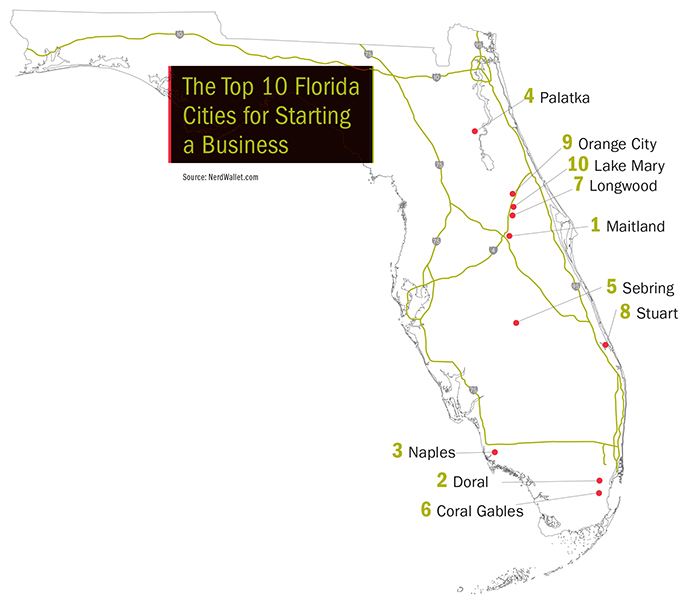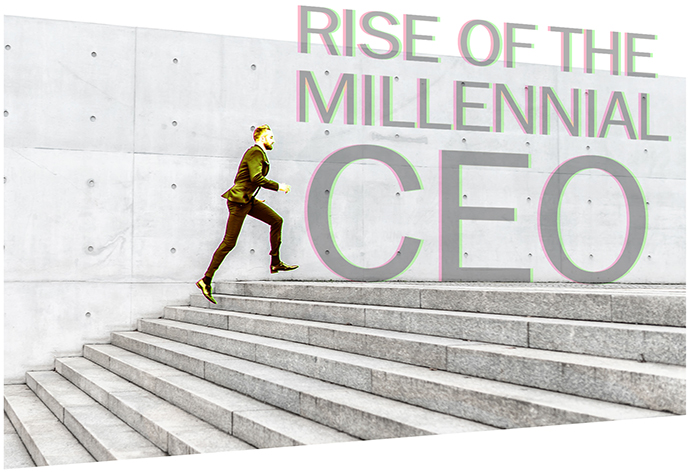Eight years after the national housing bubble burst and devastated the Florida economy, a new crop of entrepreneurs has emerged to lead a resounding economic resurgence in the Sunshine State: millennial CEOs.
Cutting against the grain of virtually every stereotype you’ve ever heard about the millennial generation (people born between 1980 and 1998), these new business leaders are forging their own reputation while shattering the mold others made for them.
They’re people like Omar Soliman, co-founder and CEO of College Hunks Hauling Junk, and Erin Meagher, founder and CEO of Beneficial Blends. Recently, each took time from their incredibly long workdays to share the lessons they’ve learned while building their businesses in Tampa. Combined with the stories of many others like them, they form a portrait of a generation that isn’t sitting around waiting to be hired by the next Fortune 500 suitor. Instead, they’re building business empires of their own and attracting other millennial leaders to join them.
A business management major at the University of Miami, Soliman submitted his business plan for College Hunks Hauling Junk to the Leigh Rothschild Entrepreneurship Competition. He won first place and a $10,000 prize.
Fourteen years later, his $50-million company employs 150 workers at its new Tampa headquarters and 1,500 workers nationwide through 102 franchises.

He’s not alone. All around Florida, millennials are launching startups, building companies and leading businesses to record-breaking levels. According to the Kauffman Index of Startup Activity, Florida ranks second only to Texas in its ability produce new business ventures, and Florida boasts the strongest startup density rate in the US.
Among all large US metro areas, Miami ranks as the second-best city in the nation for startup activity, with Tampa ranking 19th, Orlando 21st and Jacksonville 28th.
The Small Business & Entrepreneurship Council, meanwhile, ranks Florida as the fifth-most entrepreneur-friendly state when it comes to policy. Only South Dakota, Nevada, Texas and Wyoming rank higher. And just this year, venture capital firms Scout Ventures and Richmond Global Ventures opened offices in Miami, demonstrating national and international interest in the South Florida startup scene.
Why Florida Lures Millennials
Florida appeals to millennial entrepreneurs for a variety of factors, says Robert Norberg, director of strategy and research at the University of Florida in Gainesville. “Millennials like to start businesses in Florida because of the mix of cultures. It breeds ideas,” he says, adding that other factors make the Sunshine State a prime breeding ground for millennial-inspired startups:
- No state income tax.
- Cheaper living costs than many other hubs around the country. Tampa, Orlando and Jacksonville, for example, cost far less than Atlanta, Austin, Phoenix, Dallas and Denver.
- “Florida is just fun in general, with great weather, many attractions and diversity,” says Norberg.
- South Florida is a gateway to Latin America.
- Venture capitalists and angel investors are moving into the state.
- Access to money, culture and human capital is typically easier in Florida than in traditional startup hubs like Silicon Valley, Austin and Seattle.
- Startup accelerators (such as LAB Miami, the UF Innovation Hub and Innovation Academy, Florida Atlantic University programs and University of Miami programs) provide resources aimed at helping millennials start their own businesses.
- Florida’s colleges and universities are helping current students to think like entrepreneurs. FAU opened its Tech Runway accelerator this year, while Miami Dade College announced plans for its new Idea Center.
Soliman, now 34, says it’s not hard to see why so many millennial entrepreneurs gravitate to Florida. After originally basing his business in Washington, D.C., he decided to relocate the firm to Tampa in 2008 because “D.C. is not the easiest place to do business. The talent there is not geared to the entrepreneurial atmosphere. When we came to Tampa, we found that it was a very easy city to get around, and it was probably the best decision we ever made.”
The Tampa Bay Area rose to the top of Soliman’s short list for a number of reasons. “Tampa offered a great call center environment with a lot of direct response companies,” he says. “The Home Shopping Network was here. Internet and IT talent were here. PODS — a $500-million storage and moving company — was here.”
Soliman notes that “there is no way we could have hired this kind of talent in D.C. I didn’t know a lot about Tampa when I first moved here, but I have found that getting franchise owners in and out of here is very easy, and Tampa provides stress-free living.”
Recruiting other millennials to join his team is easy too, he adds. “It is easy to sell folks on living in Tampa,” Soliman says. “I just show them the water, Bayshore, Westshore — views of the water are everywhere. I show them the restaurants, etc. They want to come here.”
From Teaching Business to Practicing It
Erin Meagher, founder and CEO of Beneficial Blends, shared a similar experience. “I was 16 years old when we moved here from Baltimore, and I hated it,” she says. “Culturally, I thought it was very different. Everybody was on the beach. I was not in love with Tampa.”
Seventeen years later, she is. Recently, she was named the Tampa Bay Business Journal’s Woman of the Year in Manufacturing for leading her coconut oil company to unprecedented heights in a very short time.
Today, her organic and fair trade coconut oil brand occupies 50,000 sq. ft. (4,645 sq. m.) of industrial space in Tampa and employs 30 workers.
“Tampa is a little big town. People will talk to you here,” Meagher says. “Everyone is willing to help. Everything just grew on me here.”
Meagher, who first tried her hand at teaching business to high school students after graduating from North Carolina State University, launched her own business venture at the age of 25 in 2009 after taking a year off from teaching to study and learn everything she could about the coconut oil trade.
When she discovered the health benefits of coconut oil, she decided to take the plunge. “I saw an opportunity to have a product that is transparent in its sourcing methods,” says Meagher. “Quality was important to me. The product is fair trade and organic certified from Sri Lanka. Through diligent research from my home in Tampa, I figured all of this out.”
Beneficial Blends opened its new plant in Tampa in 2014 and quickly grew production to include distribution through Publix, ALDI and other retailers throughout Florida. Deals with Fresh Market and Harris Teeter followed. “We may hit $9 million in sales this year,” she notes.
Meagher projects that in three years, “we could add another 50 jobs. We’re getting into dry packings, coconut chips, etc. We’re purchasing our own lab equipment and continuing to build out our manufacturing.”
She also enjoys networking with other young entrepreneurs in the Tampa Bay Area. “Downtown Tampa is completely revitalized with a lot of great restaurants,” says Meagher. “I like the fact that I can from my garage at home to the gate at Tampa International Airport in 17 minutes. Where else can you do that?”
A Feathr in Gainesville’s Cap
Aidan Augustin, co-founder and CEO of Feathr in Gainesville, Florida, says a climate of support for young entrepreneurs set him and his startup on the path to success.
“I was a student at the University of Florida studying industrial systems engineering. UF has a very strong set of programs designed around entrepreneurship,” says Augustin. “UF is very good at commercializing its research. It turns research at UF into patents and businesses.”
While taking a minor in entrepreneurship at UF, Augustin discovered what he called “a robust climate of innovation in Gainesville.” Like many UF students, an internship changed his life.
“I did a summer internship at a local startup business launched by a recent UF grad. A lot of that is happening in Gainesville,” says Augustin. “I got hooked on this idea of the startup life. I had this nagging idea in the back of my head, and I decided to give it a go while I was still a full-time student with my roommate. We worked on our business on our ping-pong table.”
Augustin and his roommate moved their fledgling startup into the Florida Innovation Hub at UF and became part-time students. Next came a move to Austin and a brief stop in an accelerator.
“Once it started working well, we moved back to Gainesville. For us it made perfect sense,” he adds. “We had a pretty clear idea of where we wanted to go with our business. It had legs, and we had higher quality customers.”
Feathr, a digital marketing and predictive analytics platform for large events, went from five employees at the end of 2015 to 20 at the end of 2016. “We have over $2 million in revenue and 21 employees today,” Augustin says. “We moved out of the Innovation Hub and into our own space in downtown Gainesville in June 2016. We are now doubling our office space again.”
Florida had everything Feathr needed, says Augustin. “It is incredibly competitive to hire people in Austin,” he notes. “Everyone is looking for the same type of talent there. We were the new kids on the block. Facebook, IBM, Google and Apple were all there. The competition for talent is so much less in Florida. You can get better people at a better price here.”
Plus, he notes, “Florida has several massive universities that are research oriented. UF is a huge resource that produces a lot of smart people in STEM fields every year. And with the low cost of living, we can save a lot of money here. There is no personal income tax. Property here is cheaper. And it’s easier for families to live here. Gainesville has significant advantages.”
Augustin sees startup activity gaining steam in Gainesville. “The last five years, the city and the university have put a lot of resources behind innovation and entrepreneurship,” he says. “We were the first tenants in this office building, and a new building just opened three months ago across the street.”
He adds that “there is a lot more community engagement around innovation in Gainesville. There was an awareness gap for a while, but there was always cool stuff going on. Now it’s becoming part of doing business in Gainesville.”
As for Feathr, Augustin says, “We expect to double our headcount and triple our revenue in 2017. We have pretty clear growth targets. It is not slowing down.”

